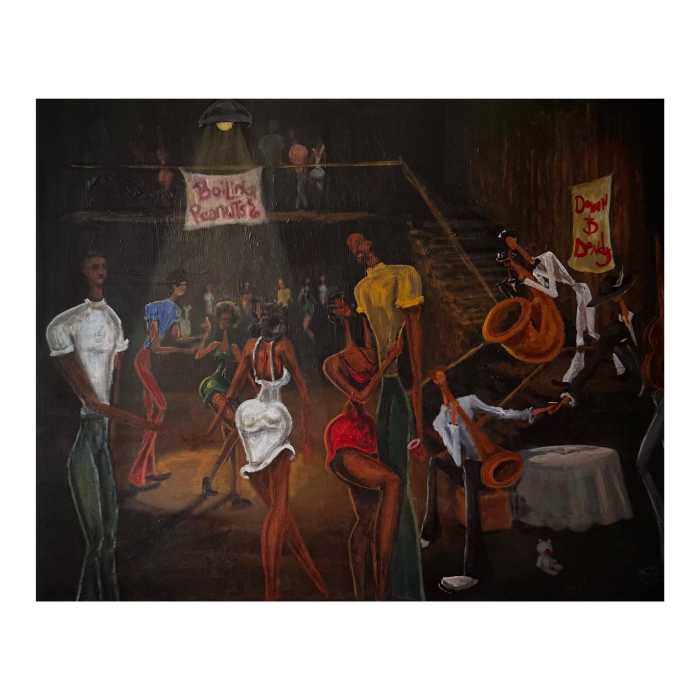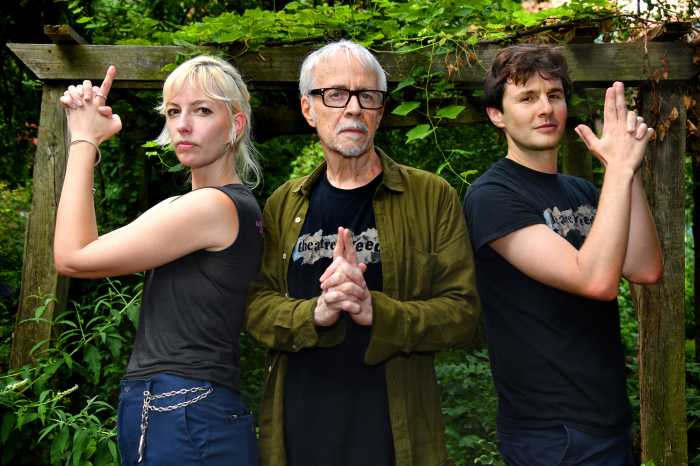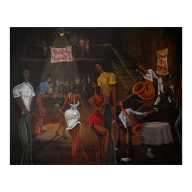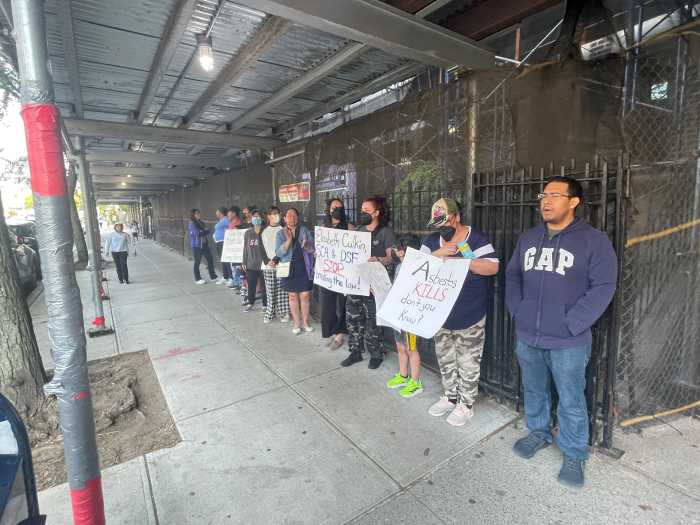BY JERRY TALLMER
At coffee shop, playwright & star talk of Paris, play, love, ‘Limonade’
A young woman whom you would look at twice, and maybe three times, sits alone at a café table in Paris, France.
An older man, a rather square American — in his 50s? maybe older? — enters and looks vaguely around.
“Are you Andrew?” the young woman asks.
“Oh, well, yes, I am,” the man replies.
“I am Ya Ya,” the young woman says. “I am a friend of your friend you were going to meet, but he cannot come because for some reason…You will have a limonade or a coffee with me?”
“Oh, yes, certainly,” the man says. “Thank you very much.”
Thus begins — well, the word “charming “ is one of the most sadly worn-out in the language, but “Limonade Tous les Jours” by is to this mind as truly charming as anything since Giraudoux and Anouilh.
And more truly sexual.
Charles L. (Chuck) Mee is an American — a quite large and vigorous American now in his early 70s — who has maneuvered around on crutches ever since being slugged by polio some 50 years ago.
Last week he and Austin Pendleton, the remarkable grey fox (actor, director, teacher. playwright) of New York theater who just now is the Andrew of “Limonade,” took time out from rehearsals to meet at what might be called a cafe table at Pier 72, an Upper West Side coffee shop,
“Your play summons up all sorts of emotions in me,” an attending journalist said to Mee.
“Yeah, in me too,” said actor Pendleton.
Mee has written, all told, some 40 or 50 plays — not least the knife-sharp “Vienna Lusthaus” for Martha Clarke — but “Limonade,” which sprang out of Mee eight or nine years ago, was, the playwright said now, “strictly personal.”
Two beats.
“When I married a woman 30 years younger than me.”
Two more beats.
“A woman you met in Paris?” Pendleton enquired.
“No.”
“Is she French?” the journalist enquired.
“No. Her mother’s Japanese, her father’s German-Jewish. Her name is Michi Barall, and we met at a Sundance, Utah, Workshop.”
Ya Ya speaks:
you want to touch me?
not there
no, not there
why?
I don’t like it
you want to touch me?
touch me here
touch me here
I’m not against the touching
I’m against where the touching is
who controls this
“Actors always have a choice,” said Mee. “A slick choice, a sleek choice, a true choice, and then the choice you [the playwright] never made. Michi had a little part, but made an amazing choice. I thought: This person, either you go up to her right now or you remain an asshole for the rest of your life
“So I walked around the table and said: ‘Hello, will you marry me? — or just have a cup of coffee?’ ”
“She said: ‘I’ll have a cup of coffee.’
“The first night we ever spent together was in Brooklyn, September the tenth, 2001. Woke up to see smoke coming over from Lower Manhattan to Brooklyn.”
“Oh God,” Austin Pendleton said.
“We got married in 2003. Under my evil influence,” Mee said, “Michi has started writing plays, and the first one, ‘Rescue Me,’ an adaptation from Euripides, is in rehearsal at the Ohio Theatre at this very moment, And we’ve adopted a baby girl from China named Josephine.”
“Where did you get the name Ya Ya from?” the journalist wondered. “Out of thin air?”
“Yes, out of thin air,” Mee answered. A split second later: “The thin air of Paris. And you know where ‘Limonade tous les jours’ is from? It’s what’s printed at the bottom of every menu at La Coupole’ [the historied Montparnasse hangout of Hemingway, Jean-Paul Sartre, Simone de Beauvoir, et al].
Actor Pendleton said to playwright Mee: “Your play feels like it was written very quickly.”
“It was,” the playwright said.
“How did it get to you, or you get into it?” the journalist asked the actor.
“Well,” said Austin Pendleton, “three years ago I was at the New School, teaching direction, using Chekhov’s ‘Three Sisters’ and Beckett’s ‘Endgame,’ and one of my students, Diana Basmajian, used this play, ‘Limonade Tous les Jours,’ for her spring project. Just one performance.”
Two months later, “Limonade” had another one-nighter, this time at the theater called 59E59. The Andrew of that performance was Austin himself, the director was (and now is again) Diana Basmagian, the Ya Ya, that delicious girl, was (and is again) Eleanor Handley
…how do you let your imagination run free?
You see a dress, you think,
oh, I can see her in that
she moves toward me
the breeze ruffles the skirt
it Is silk
it is so sheer
I see the shape of her leg
I see even the contour between her legs
I can think, OK, now, how would I get her into bed?
I take her to a café
and then I am thinking
we are in bed making love
I smell her perfume…
you don’t know where you are any more
you are in heaven
the world has disappeared
and you are living in eternity with love
The language of this play of Mee’s is, says Pendleton (who has had to learn its lines twice in three years) “very intricate, so you don’t want to use the wrong words, or even the right words in the wrong order. You do that with any play, but…”
He breaks it off, meaning not with this play. You don’t monkey with this play.
Both Mee and Pendleton have been to Paris a number of times. Mild-mannered Austin Pendleton, playwright, most fondly remembers the woman who jumped up from her seat at an Off-Seine production of his “Uncle Bob,” screaming, in French: “This is the work of Satan!”
“Best accolade I’ve ever had,” says Pendleton.
Charles Mee rather oppositely remembers going to Paris with his Michi for their engagement.
“I guess I’ve always thought,” Mee says, “that Parisians are the experts in how to engage in the ordinary pleasures of daily life. So if you’ve ever been an older man walking down the street with a younger woman…”
Cross your fingers and buy her a limonade.





































